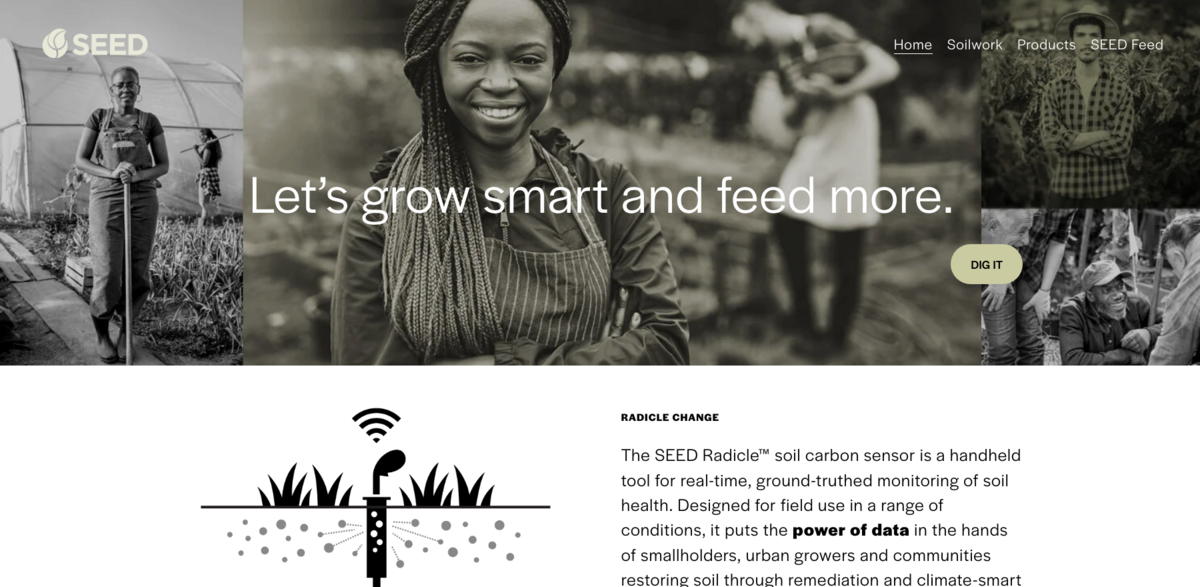What is the SEED Project?
LET’S GROW SMART AND FEED MORE. The SEED Radicle™ soil carbon sensor is a handheld tool designed for real-time, ground-truthed monitoring of soil health. It’s built for field use across a variety of conditions, putting the power of data directly into the hands of smallholders, urban growers, and communities working to restore soil through remediation and climate-smart action. No lab. No lag. Just actionable data that anyone can use.
Main Benefits of the SEED Radicle™ Sensor
This innovative tool offers a range of benefits that make soil health monitoring accessible and effective:
- Measures CO2 from soil respiration, providing accurate soil carbon data
- Field-ready, rechargeable, and portable—perfect for on-the-go use
- Syncs seamlessly to mobile devices for live data updates
- Supports traditional knowledge while promoting self-determination
- Affordable and simple, designed especially for smallholders and urban farmers
Empowering Smallholders and Urban Growers
Smallholders grow most of the world’s food. Some need tools that lift them out of subsistence, others need tools that abate pollution. All of them need simple, smart, affordable tools that support traditional knowledge, uphold self-determination, and increase incomes. At SEED, those tools are the agtech that lies at the vibrant intersection of environmental progress and food justice. It’s about giving power back to the people who feed the world.
SEED’s Commitment to Sustainability and Food Security
The SEED Project started back in 2010 as a non-profit initiative focused on promoting sustainable practices and food security in South Los Angeles and Cuba. Fast forward to 2019, SEED became a benefit corporation, solidifying its commitment to sustainability goals and agriculture technologies that support food security. It’s a portfolio company of LACI, the Los Angeles Cleantech Incubator, which means it’s backed by a strong network dedicated to cleantech innovation.
Technology Meets Food Justice
SEED’s approach is unique because it combines cutting-edge technology with a deep respect for food sovereignty and climate justice. The Radicle™ sensor isn’t just a gadget; it’s a tool for change. By measuring soil carbon directly in the field, it helps growers understand their soil’s health and carbon sequestration potential. This data is crucial for regenerative agriculture practices that restore the land and fight climate change.
Project Impact on Sustainable Development Goals (SDGs)
- SDG 2: Zero Hunger – Supporting food security through better soil management
- SDG 12: Responsible Consumption and Production – Promoting sustainable agriculture
- SDG 13: Climate Action – Enabling climate-smart farming and carbon sequestration
- SDG 15: Life on Land – Restoring soil health and biodiversity
- SDG 8: Decent Work and Economic Growth – Increasing incomes for smallholders
- SDG 11: Sustainable Cities and Communities – Supporting urban farming initiatives
Looking Ahead: The Future of Soil Health Monitoring
With a B Corp score of 151.9, SEED stands out in the Other Manufacturing industry for its dedication to sustainability and social impact. The project’s focus on agriculture, technology, soil health, carbon sequestration, smallhold farming, regenerative agriculture, food security, food justice, food sovereignty, climate justice, and urban farming makes it a powerful force for change. As more communities adopt tools like the Radicle™ sensor, the future looks promising for smarter, more sustainable food systems worldwide.


















